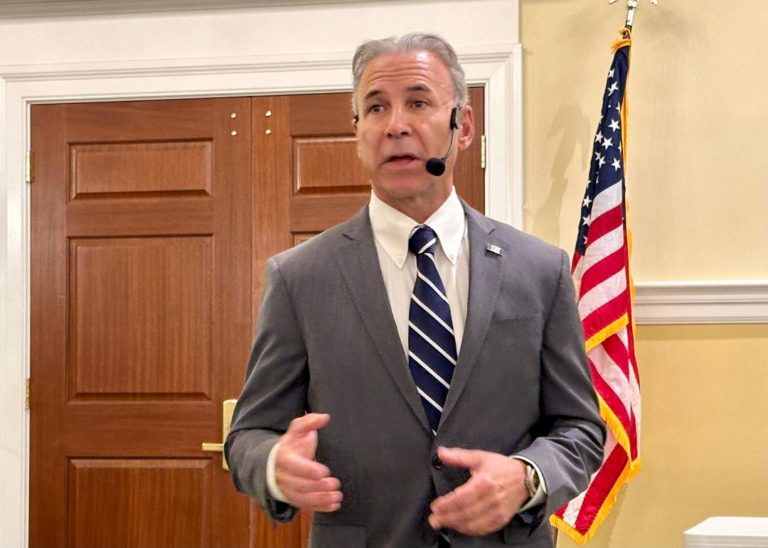
By Bill Slocum
Contributing Editor
State Sen. L. Scott Frantz warned members of the Rotary Club of Greenwich last week that Connecticut’s current fiscal policy puts it on track to become the next Detroit: Broken down, fiscally insolvent, and a place businesses flee.
“The lesson we have learned from Detroit is you’ve got to get your fiscal house in order,” said Frantz, a Greenwich resident who represents the town along with parts of Stamford and New Canaan. “That is exactly what we do not have.”
Frantz provided his bleak commentary to the Rotarians at their regularly Wednesday lunch gathering at the Hyatt Regency in Old Greenwich.
Frantz’s criticism may not surprise those who know Frantz is Republican and the state is led by members of the other major party. It was his stark tone that seemed to impress his audience. To those who argue that Connecticut is a long way from Detroit’s headline-producing misery, Frantz countered that the state is on the same spending path, with deficit spending propelled by public-sector pension costs and tax hikes that drive out businesses.
When asked by Rotary Club president Russ Harden about recent news General Electric will vacate its Fairfield, Connecticut headquarters and relocate in Massachusetts, Frantz described it as an example of overtaxed businesses saying enough, calling it a harbinger of things to come.
“It’s very much about taxes,” he said. “They were sick and tired of the taxes, as well as proposed taxes.”
Democratic Gov. Dannel Malloy has said GE’s departure was prompted by aging infrastructure, and to that end is proposing the state take up a new $100 billion transportation improvement initiative. Frantz questioned how a state that runs close to $90 billion in unfunded liability costs, mostly in pensions, can take up such an ambitious project.
“If we can’t balance the budget to save our lives, how are we ever going to pay for $100 billion?” Frantz asked.
Continuing the Detroit analogy, Frantz noted that a four-bedroom house in that city, comparable in lot size and square footage to a $3 million home in Old Greenwich, could be bought in 2009 for $8,412. He asked his audience what would happen if Greenwich homeowners found themselves facing a similar predicament with what he termed “their ultimate pocketbook.”
He also noted ongoing social-services cuts, such as the recent cancellation of a service contract by the state Department of Children and Families with Cos Cob-based Kids In Crisis.
“It’s exactly what I’ve been predicting for the past seven years,” Frantz said. “The cost of core government will crowd out funding for these important programs that people desperately need.”
Frantz said Detroit has taken major steps to improve its fiscal standing in the last few years, but added it may be too late. He said Connecticut may have “three to five years” left to focus on an outsized spending problem he likened to the Return Of The Jedi’s Jabba the Hutt, “that keeps eating frogs, because that’s what it does.”
“We need to stop it, and we need to stop it now,” he said.
Frantz said he plans to devote his work in the upcoming 2016 legislative session on matters related to the fiscal situation, such as building a new “lockbox” for transportation issues and closer adherence to a constitutionally-mandated spending cap.
“It’s a really bad, bad time for Connecticut,” he said. “Next time you ask me back, if you ever do after today, I will have better news for you. Because frankly, it can’t get any worse.”




